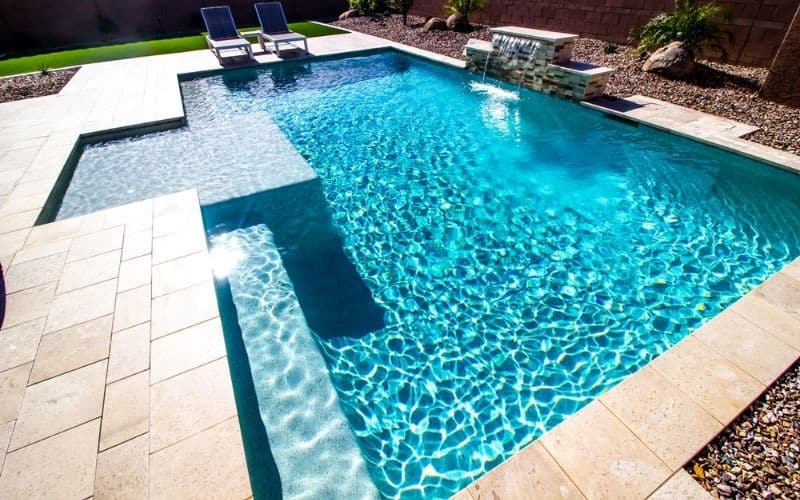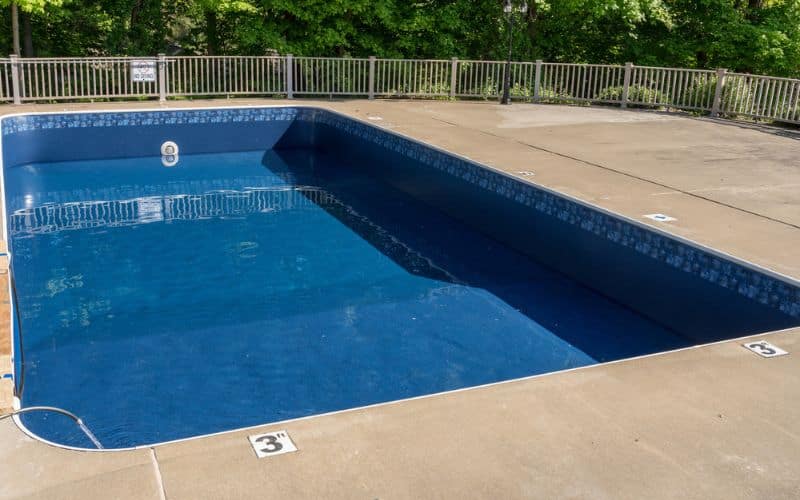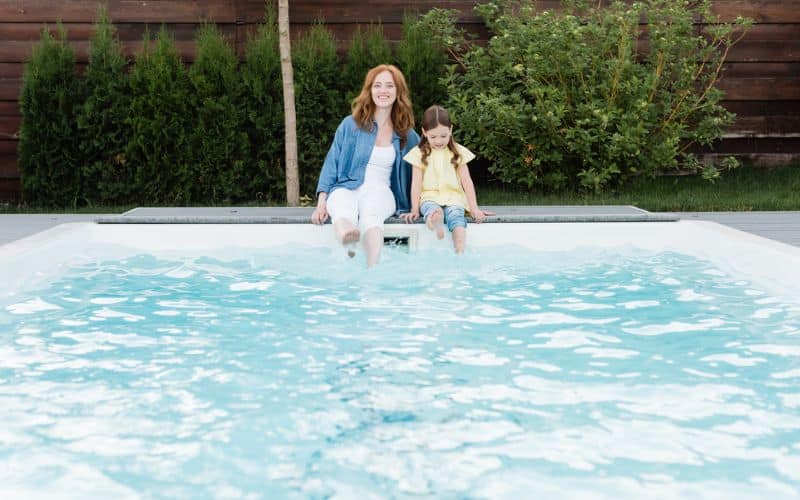
When you’re planning to install a pool in your backyard, one question that might pop up is how thick are pool walls? The thickness of your pool walls plays a vital role in its longevity and stability. Generally, the wall thickness can vary from 0.4mm to 1mm for vinyl liner pools while fibreglass and concrete pools have significantly thicker walls.
If we dive into specifics, the thickness of vinyl liner pools mainly depends on the material used. Vinyl liners typically come with different gauges or millimetres indicating their thickness. A higher gauge means a thicker liner which offers more durability but at an increased cost.
On the other hand, fibreglass and concrete pools boast much sturdier construction compared to vinyl counterparts due to their considerably thicker walls – usually around 8-12 inches for fibreglass and upwards of 6 inches for concrete variants.
Remember that selecting an appropriate wall thickness isn’t just about durability – it’s also about ensuring your family’s safety during those summer swim sessions!
Understanding Pool Wall Thickness
Getting your head around the thickness of pool walls can feel a bit like diving into the deep end. But don’t worry, you’re in safe hands. Let’s break it down together.
First off, you’ll need to understand that pool wall thickness can vary greatly depending on the type of pool. For instance, an above-ground vinyl liner pool typically has walls that are about 0.6mm thick while concrete pools boast walls as thick as 20cm or more.
Let’s delve into some specifics:
- Vinyl Liner Pools: These types of pools usually have steel or aluminium walls and their thickness generally falls between 0.6mm and 1mm.
- Fibreglass Pools: Fibreglass shells are thicker than vinyl liners with an average wall thickness ranging from 8mm to 12mm.
- Concrete Pools: Concrete is king when it comes to durability and strength; hence its popularity for large commercial swimming pools. The typical concrete pool will have a wall thickness between 15cm and even up to a whopping half meter!
What does all this mean for you? Well, if longevity is your goal (and let’s be honest – who doesn’t want their investment lasting?), then going for thicker walled options like fibreglass or concrete could be beneficial in the long run.
There isn’t one-size-fits-all answer when it comes understanding how thick should be your swimming pool’s walls but considering factors such as local climate conditions, ground stability along with personal preferences may guide you towards making right choice for yourself!
Factors Influencing the Thickness of Pool Walls
Peering into your pool, have you ever wondered what factors determine its wall thickness? There’s a host of elements at play here. Let’s delve into some of them.
The first key factor is MATERIAL USED. Pools can be made from various materials, each with different durability and thickness requirements. Concrete pools are typically thicker than vinyl or fibreglass ones due to the nature of concrete as a material itself.
Secondly, the SIZE AND SHAPE OF THE POOL plays an integral role too. Larger and more complex shaped pools need sturdier walls to withstand water pressure, hence thicker walls are necessary in such cases.
Thirdly, it’s worth considering ENVIRONMENTAL FACTORS like soil type and climate conditions where your pool is located as these can impact wall thickness too. For instance, if you’re living in an area prone to earthquakes or having loose soil type which could shift easily over time – your pool walls should ideally be built stronger (hence thicker) for added stability.
Another important consideration is SAFETY REGLATIONS AND BUILDING CODES which vary across locations but generally require specific minimum standards for structural integrity that may influence wall thickness.
Lastly but crucially: USAGE EXPECTATION impacts how thick your pool walls will end up being. If you’re planning on using it regularly for vigorous activities like swimming laps or water polo games – then anticipate needing thicker-than-average walls due to increased wear-and-tear expected over time.

Different Types of Pools and Their Wall Thickness
When you’re choosing the perfect pool for your garden, it’s crucial to consider more than just aesthetics. One important aspect that often gets overlooked is wall thickness. Depending on the type of pool you choose, this could vary significantly.
First up are concrete pools, one of the most popular choices in Canada due to their durability and flexibility in design. The walls for these types usually range from 6 inches (15 cm) to 12 inches (30 cm) thick depending on their size and structure.
In contrast, fibreglass pools feature a completely different construction process. These pre-formed shells are transported directly to your home where they’re installed into an excavated hole. As such, their wall thickness remains constant at around 3/8 inch or approximately 1 centimetre – far less than a concrete pool but still providing sufficient strength due to its unique composition.
Next we have vinyl liner pools which consist of metal or polymer panels forming the frame with a customised vinyl sheet serving as the liner inside. Here too, we see variation with typical wall panel thickness ranging between 2-4 mm depending upon manufacturer specifications and model variations.
Lastly let’s talk about above ground pools – an economical choice loved by many Canadians! While these don’t require any excavation work like inground counterparts do; they still provide reasonable durability thanks largely to steel walls measuring roughly half an inch (~1 cm).
Importance of Appropriate Pool Wall Thickness
Diving straight into the heart of the matter, it’s important to remember that a pool isn’t just about fun and games. When you’re planning your dream pool, one key consideration should be its wall thickness. You might be wondering why this is so critical? Well, let’s unravel this mystery together.
The thickness of your pool walls plays a crucial role in ensuring its durability and longevity. If they’re too thin, they may not withstand the pressure exerted by thousands of litres of water within them. Moreover, environmental factors such as soil type and weather conditions can also add to this strain over time.
Let’s consider some numbers:
| Pool Type | Average Wall Thickness |
|---|---|
| Concrete Pools | 6 – 8 inches |
| Vinyl Liner Pools | 42 – 48 inches |
| Fiberglass Pools | Varies (approximately an inch) |
Now that you’ve seen these figures for yourself, it’s easier to appreciate how varied wall thicknesses can be across different types of pools.
Besides structure stability and lifespan extension, appropriate wall thickness also contributes towards better heat retention in heated pools. Thick walls act as insulators keeping your pool warmer for longer periods thus reducing energy consumption which is great news for both your wallet and our planet!
Another advantage comes from safety perspective – thick walls reduce risk related with potential leaks or ruptures thereby ensuring swimming experiences are safe without any unwelcome surprises!
But don’t forget – while thicker may often mean stronger when talking about pool walls; there’s always a balance to strike since excessively thick walls could unnecessarily escalate construction costs without significantly improving performance or safety levels.
So whether you’re planning on building an Olympic-sized behemoth or simply want a cosy backyard splash spot; understanding importance around correct pool wall thickness will surely make waves in enhancing overall quality!

Conclusion: Making Sense of Pool Wall Dimensions
When it comes to understanding the thickness of pool walls, there’s a lot to take into consideration. Firstly, you need to remember that different types of pools have varying wall dimensions.
For instance:
- Concrete pools typically have the thickest walls – usually around 6 inches.
- Vinyl liner pools generally come in at about 3-4 inches thick.
- Fibreglass pools are somewhere in between, with an average wall thickness of around 5 inches.
Now, these numbers might seem fairly small on their own. But when you consider the overall structure and design of a swimming pool – including both its internal and external components – it becomes clear that even an inch can make quite a difference!
Why is this so important? Well, thicker pool walls provide better insulation which means less heat loss. They’re also more resistant to structural damage caused by ground movement or heavy loads from water pressure.
On top of this, material quality matters too! The right materials can significantly enhance your pool’s durability and lifespan:
- High-quality concrete provides excellent strength and longevity
- Premium fibreglass offers superior resistance against cracking
- Top-grade vinyl ensures maximum waterproofing capabilities
So while it may seem like just another minor detail in the grand scheme of things – don’t underestimate how crucial your choice could be! Whether you’re planning for a new build or looking at upgrades for an existing one; taking some time out now could save you significant hassle (and potentially money) down the line.








